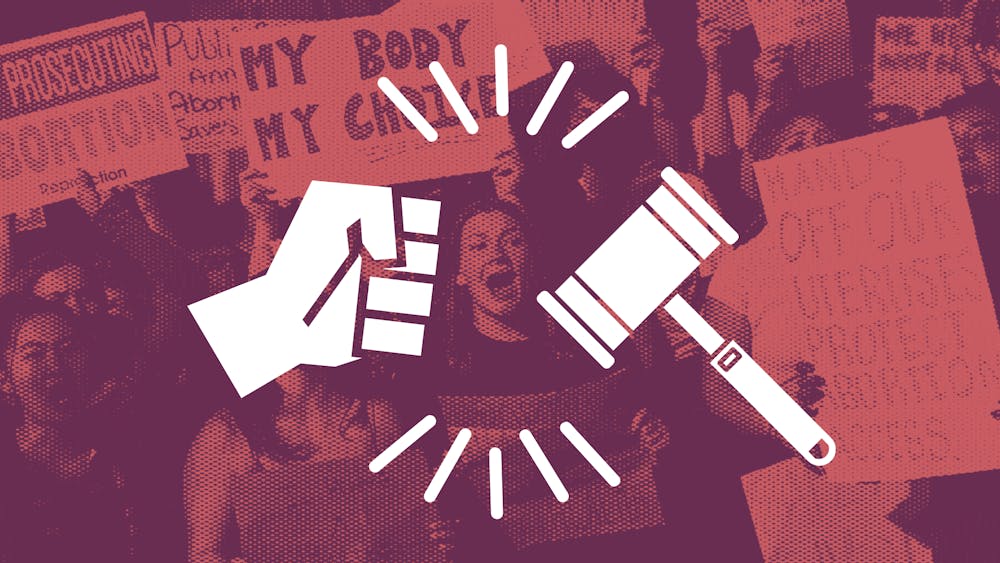
The social contract theory is a centuries-old concept of political governance which generally asserts that government exists only by the consent of the governed in order to protect basic rights and promote societal wellbeing. On June 24, the Supreme Court of the United States tore this tacit agreement to shreds, overturning Roe v. Wade in a 5-4 decision and returning the regulation of abortion rights to the 50 states.
The Dobbs v. Jackson decision, while not surprising following the draft leak in May, spits in the face of the court’s duty to protect civil rights and liberties both as an institutional responsibility and as a tenet of the social contract. The United Nations High Commissioner for Human Rights lists both abortion and maternal mortality prevention as human rights, one of the many national and international institutions to do so. However, this does not square with the fact that the ruling amounts to an indirect ban on abortion in twenty-six states which are certain or likely to do so, while data shows an abortion ban would lead to a 21% increase in maternal mortality.
In fact, restrictions on abortions have been shown to have a small to negligible impact on the actual incidence of abortion, while having an outsized negative influence on the rate at which unsafe abortions occur. Given the fact that the ruling most likely will not decrease abortion rates but instead put millions of women at risk while legally denying them a fundamental right, the court has broken the figurative social contract.
But has the court similarly, and irrevocably, broken the trust of the American people?
The answer is twofold. The decision handed down, while shattering precedent, is not written in stone and remains reversible, although such a development is unlikely for decades based on congressional politics. However, while women’s rights remain an unsettled issue in this country, this reversal of long-standing precedent wounds the court’s credibility with those who — it often seems to forget — it serves.
In a shocking blow to stare decisis, the legal doctrine that courts will adhere to precedent in making their decisions, Dobbs v. Jackson marks the first time the court has ever overturned a prior case which extended a constitutional right. This is not to say that precedent is immutably king; after all, the court has overturned its own precedents 145 times, including famously striking down the separate but equal standard established in Plessy v. Ferguson in the landmark Brown v. Board of Education decision.
While precedent should not always be upheld, the clear politicization of the court on the issue of abortion, and others, has possibly forever handicapped the institution’s ability to operate effectively. Indeed, by allowing politics to infiltrate the court and subsequently inform its decisions, it would not be shocking if Americans increasingly view the court as an echo chamber of ideology as opposed to the impartial arbiter of the Constitution.
For such a perception to develop, however, would terminally delegitimize the court, a possibility which, in the face of growing polarization, cannot be taken lightly. Remember when then-President Andrew Jackson ignored the court’s ruling in Worcester v. Georgia, which stated the seizing of Cherokee lands on which gold was found was unconstitutional? If you do, you also probably remember Jackson’s famous response to the ruling: “John Marshall has made his decision, now let him enforce it.”
Aside from serving as apt political theater, the historical example underscores a major institutional flaw of the court: it has no enforcement power. The entire basis of the court’s power to dictate law and therefore inform policy rests on the fact that the American public and its representatives view its decisions as legitimate. A continual reversal of precedent would undermine this legitimacy in a substantial way, indicating that as the court’s make-up changes, partisan loyalties, as opposed to the Constitution, inform key rulings.
While I hope to see the protections guaranteed under Roe v. Wade codified and statutes upholding women’s rights signed into law around the country, any future move to overturn Dobbs v. Jackson would amount to the reversal of a precedent-reversing precedent. That’s a tongue twister, and therein lies the problem. Should the court be expected to extend and retract abortion access as a constitutional right every few decades, even as the Constitution remains unchanged?
To do so, the court would be tacitly admitting that it is little more than yet another venue for politicking. And a delegitimized court is an ineffectual court. During oral arguments in December, Justice Sonia Sotomayor asked, “Will this institution survive the stench that this creates in the public perception that the Constitution and its reading are just political acts?” The answer remains unclear, but an attempt to overturn Jackson would amount to an unequivocal no. The court has effectually shot itself in the foot on the issue of abortion rights.
But more importantly, in the process it has also similarly crippled tens of millions of women across the United States.
VINAY KHOSLA is a rising College sophomore studying philosophy and political science from Baltimore, Md. His email is vkhosla@sas.upenn.edu.
The Daily Pennsylvanian is an independent, student-run newspaper. Please consider making a donation to support the coverage that shapes the University. Your generosity ensures a future of strong journalism at Penn.
Donate



